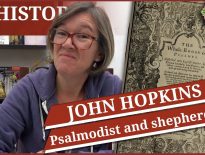On this day in Tudor history, 22nd October 1577, Henry Parker, 11th Baron Morley and Roman Catholic exile, died in Paris. Morley had fled abroad in 1570 after refusing to subscribe to Elizabeth I's “Act of Uniformity” and after being implicated in the 1569 Rising of the North.
Find out more about this Tudor man, who was the nephew of Jane Boleyn, Lady Rochford, and his rather interesting family, with their connections to the trial of Mary, Queen of Scots and the Gunpowder Plot, in today's video.
By the way, if you're interested in the Parker family, then you'll want to check out Tudor Society member Dr Catie Clark's blog on Sir Henry Parker, Lord Morley (1481-1556), grandfather of today's Lord Morley - see http://lordmorley.com/. Catie also did us an exclusive report on the Parker Family tomb - click here.
Also on this day in history:
- 1521 – Death of Sir Edward Poynings, soldier, administrator and diplomat at his manor of Westenhanger in Kent. Poynings served Henry VII as Lord Deputy of Ireland and Henry VIII as an ambassador, Lord Warden of the Cinque Ports and Chancellor of the Order of the Garter.
- 1554 (22nd or 23rd) – Death of John Veysey (born John Harman), Bishop of Exeter, at Moor Hall, Sutton Coldfield, Warwickshire.



I guess Lord Morley (Jane’s father), died after his son? That’s why his grandson inherited the title?
Also, why wouldn’t he take his family with him? That seems risky, to leave them behind while he runs for his life. Yes, a very interesting man (whole family, really), but I question why he left behind his family.
Probably due to practicalities. I would think that he’d want to establish himself abroad and find a home for them before organising for them to travel. It was far easier for one man to flee than a whole family.
Yes, Jane’s father outlived his son so the title passed to his grandson.
It was always a difficult thing when you were on the wanted list for the government secret police after being involved in a revolt or two against a Tudor oppression, to decide to escape abroad, to ask for licence and move with family or to take a chance at large at home or even to seek a pardon. I would guess he left his family because he didn’t have leave to go into exile. When you fled abroad it was a criminal offence and if caught you could be executed for treason. Already in trouble Henry Parker was on the radar and taking his family abroad would have been exceptionally difficult. It was dangerous to do either, it was a complete dilemma, but unfortunately for Henry Parker, this decision meant they were at the mercy of Elizabeth and her government and were harassed as a result. It would of course have been better for him to have gone on license with family but still difficult travelling with them, getting permission to go from one country to another wasn’t easy, but a man alone could travel more swiftly and incognito. It may be saving his own life, but in the circumstances, he probably had little choice.
The Bertie family aka, Richard Bertie and Katherine Willoughby, Duchess of Suffolk went abroad into exile on the license of Queen Mary before the former was arrested on religious grounds. They took their two children, little Susan being a baby, but travel was extremely difficult and slow and they had to travel on from one country to the next, were not welcome everywhere and got chased out of Westphalia in Southern Germany, before being allowed to travel through and remain in Poland. Even then they had to apply to the Govenor and give certain guarantees and worked for their keep. The journey was horrendous. This was Europe in the 16th century, full of division and religious wars and persecution, mostly Catholic, but with large areas of territory sympathetic to Protestants and cities who refused to help either. Germany was full of semi independent free states, with local rulers having a great deal of independence; it wasn’t a United country and certainly not the EU, travelling even with permission was dangerous and one person had a better chance of mobility than two people with a young family. Exiles didn’t know who to trust, certain communities grew up in cities which acted as sanctuaries, such as Geneva for the none conformist groups from Scotland and Ireland and Madrid were a number of Catholic scholars took refuge, Paris and Rome also, but these were mostly men seeking the priesthood, few exiles were entire families. Permission was granted to the Berties because they were nobles and highly in favour. Henry Parker was also from the gentlemen class, his family had served the two previous Kings and Queen Mary, but they were implicated in treason and rebellion: he was unlikely to be granted permission to go into exile, so he didn’t bother to ask, he went alone and made the terrible decision so many others did, to leave his family behind him.